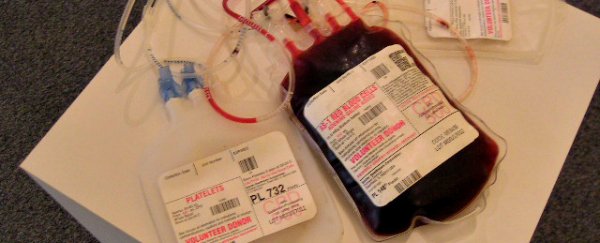An eight-year-old Canadian boy has become severely allergic to fish and peanuts after receiving a blood transfusion, according to a new report.
The boy could eat both foods without any problems until he underwent transfusions to help treat his medulloblastoma - a type of brain cancer - several months ago. A few weeks later, he ate some salmon, and after 10 minutes was rushed to hospital with a dangerously swollen and lips.
The doctors treated him for the reaction and told him to avoid fish, but four days later ended up back in hospital after eating a chocolate peanut butter cup. It turns out he was allergic to peanuts now too.
"Right away, we wondered what has happening that was different," Julia Upton, the boy's doctor who has written about the cause for the Canadian Medical Association Journal (paywall), told ABC News. "Why would he all the sudden react to a food that he clearly has eaten for years?"
They eventually worked out the trigger must have been the blood transfusion, part of which had come from a donor who had fish and nut allergies. This transmission of allergies is known as 'passive transfer' and is extremely rare, but not unheard-of.
So how exactly does getting someone else's blood make you suddenly allergic to certain foods?
The culprit was a protein known as immunoglobulin E (IgE), which was present in the blood of the donor, and triggered the reaction in the young boy. IgE is an antibody that, upon encountering certain foods, causes immune cells to release histamines that trigger an allergic reaction.
"It just so happened that one of the blood products that the child received contained a lot of plasma from that donor," Upton told ABC News. "The plasma is where the antibodies are."
But despite the fact that these antibodies are commonly found in people's blood, a lot of factors need to align for an allergy to be passed on to a transfusion recipient.
Dina Fine Maron over at Scientific American explains:
"First, the blood donor must have high levels of IgE antibodies - those that react against allergens. Second, a substantial amount of blood product must be given to the patient. Then, in order to detect the new allergy, the patient would have to be exposed to the specific allergen the antibodies would react against within a few months of receiving the transfusion. That window is tight, because passively acquired antibodies will naturally fade after a few months and the transient allergy will disappear."
To put that into perspective, the Canadian Blood Service reports has distributed more than 10 million blood components for transfusion over the past decade, during which time only two other cases of passive allergy transfer have been reported.
The good news in all of this is that the boy's allergies have now faded and he's able to eat whatever he likes again, and doctors have learnt a lot about how allergies can be spread as a result of the unusual case.
And this isn't the only unusual result of a transfusion this year - a few months ago, doctors reported that a patient had become obese following a faecal transplant.
Right now most countries don't screen whether blood donors have allergies before accepting their blood, simply because otherwise they'd have even less people able to contribute to their already limited supplies. By further understanding how often and by which mechanism allergies and other illnesses are passed on through biological materials, doctors will hopefully be able to prevent this from happening in future.
Sources: Scientific American, ABC News
